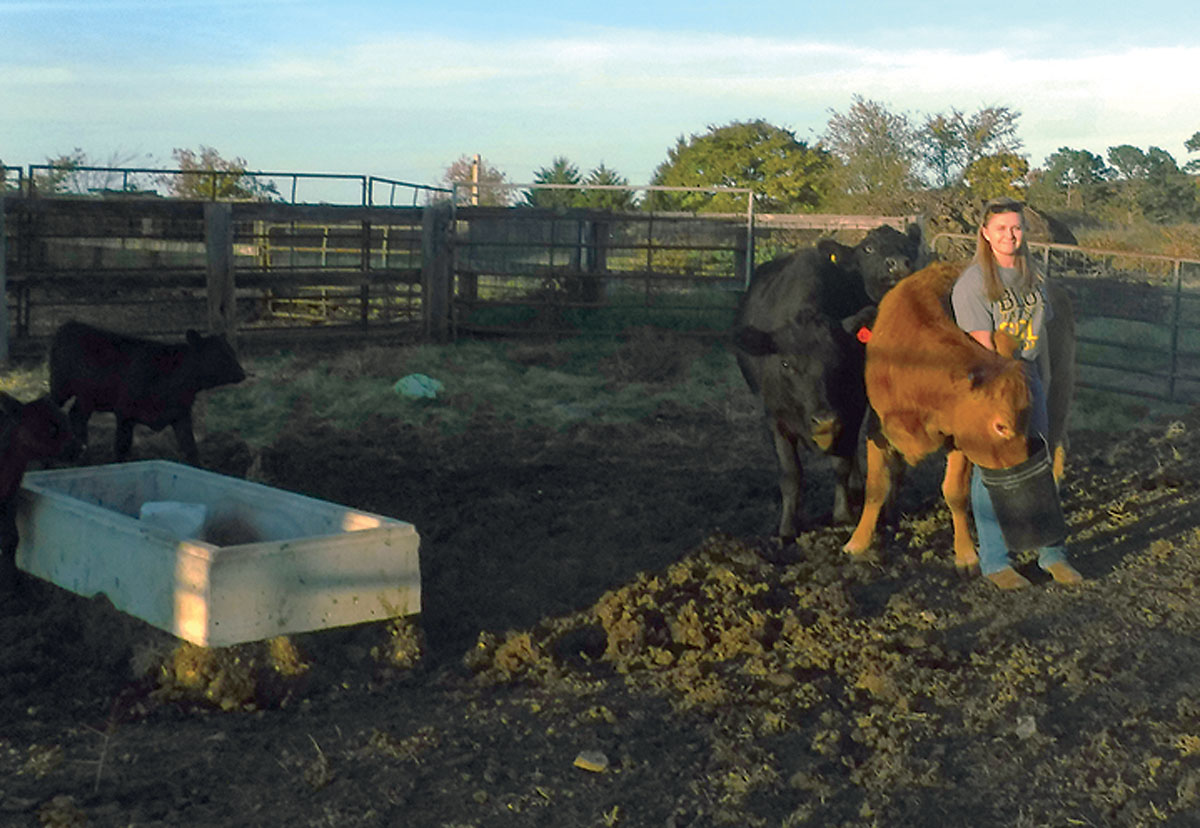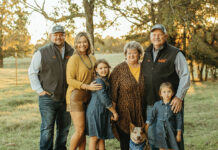
Laney Duvel’s career plans include continuing with the family farm and being an ag teacher
Laney Duvel knows all about the hard work that goes into farming.
The Rolla High School sophomore has been helping run the Duvel-Mathis Farms cattle operation since she was small.
“I have been raised around farming on both sides of my family. I’m the seventh generation on this farm,” she said proudly.
The oldest daughter of Heather and Jeff Duvel, Laney was interested in farming even as a toddler.
“I got out there with my dad and my grandpa, helping to check cows,” she explained.
Laney is active in FFA, and manages to work a full day of school in with her duties at the farm.
“Most of the time, during the winter, I come home from school; my dad doesn’t get home before dark,” Laney said. “So I’m out there feeding the hay, making sure the watering system is unfrozen, making sure that’s all done before it gets dark.”
When asked what her favorite classes were in school, Laney grinned, “Ag classes,” she said. “We started a new class, ag structures, where we start building stuff, run-in sheds, feeders, small projects. It’s only a semester class, but it helps get your feet wet.”
The farm is home to 50 females and 45 calves, watched over by an Angus bull, affectionately named Twinkle Toes.
Currently, live cover is used for breeding, but Laney would like to become certified in artificial insemination.
“My first heifer was AI’d,” Laney said of the first animal she took to the Phelps County Fair.
The beef cattle operation was originally home to dairy cows, but the family found the cost of getting their product to market too expensive, due to closure of the routes used to transport their milk. Angus cattle replaced the dairy herd in the late 1980s. Laney said the family chose black Angus for their ease of care and high meat yield.
It’s easy to see how proud Laney’s grandparents, Londa and Don Mathis are of their granddaughter. An enthusiastic participant in 4-H, Laney has shown her cattle at the Phelps County Fair, and in 2017, her steer won Over-All Grand Champion Market Steer.
“She won everything that year with that steer, and that is something that had never been done before,” Londa stated.
When asked if she has any hobbies, Laney didn’t hesitate before responding “dirt bike riding.” She is an avid deer hunter and enjoys horseback riding, when time allows. While she has won awards for her horsemanship, it’s clear to see Laney’s heart belongs to her cows.
Laney spends time each day with the cowherd, but three heifers receive special attention during show season. Dolly, Darlin’ and Loretta Lynn are kept separate from the other heifers during show season, and then allowed to mix in with the cowherd when the season ends.
When surrounded by the herd, it is obvious Laney’s cattle trust her as much as she cares for them. Both momma cows and calves gathered around, nosing the feed bucket, allowing Laney to pet them. Twinkle Toes the bull called to his heifers, and stood docilely close by.
Laney finds not losing patience and getting frustrated with everyday problems the most challenging part of farming. She has lost calves to disease and predators, such as coyotes.
“You can hear them at night,” Laney said of the coyotes that howl in the evening. A neighbor has also warned about a bear he saw in the woods nearby. A conservation agent tracked that same bear, which was collared.
Always planning for the future, Laney would like to change some aspects of how the farm is run. In addition to increasing the herd size to between 150 to 200 head, she wants to add some additional crops. Currently, the family grows 20 acres of corn and 15 acres of alfalfa, most of which is fed to their cattle. Laney grows one to five acres of sorgum, used to make molasses.
Laney would like to separate the bull from the herd for a few months each year, ensuring all heifers are on the same cycle, so they calve at certain times in the year. She plans to introduce rotational grazing in the near future.
The family follows a strict immunization schedule for their cattle, and vaccinate against worms and parasites, as well as blackleg, and respiratory and bacterial infections that can kill.
“We learned a long time ago, you do it yourself, fix it yourself,” Londa said, when asked how often they provide their own medical care for their cattle.
Like anyone who works in the farming industry, Laney learned to acknowledge the realities of caring for animals which will be eaten.
“I’ve just been raised around eating my own food,” she said. “We have a garden and a green house, we raise that food, and we have our own meat.”
When the time comes to sell their cattle, they are taken to the stock yard in Lebanon, Mo.
This year’s drought didn’t affect the farm as much as it could have.
“We had fertilized just in time, and we got our first cut early before the drought hit,” Laney said. The farm also received rain other parts of Missouri didn’t get. Three ponds and an automatic watering system help ensure the herd doesn’t go thirsty.
Like many modern farm families, mom and dad have had to take outside jobs in order to keep the farm viable.
“You’re not going to make a living at it,” Londa replied when asked how profitable having 50 head of cattle can be.
Laney will soon turn 16, and is full of plans for the future. She is considering becoming an ag teacher, and wants to learn welding, both as a way to add additional income to the farm.
With a strong work ethic, plans for the future, and a love of the land that is obvious, Laney Duvel’s continued success running the family farm seems assured.






